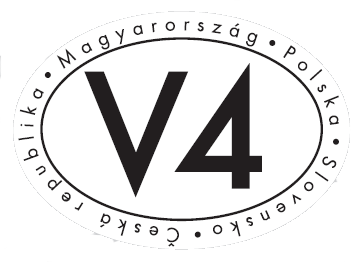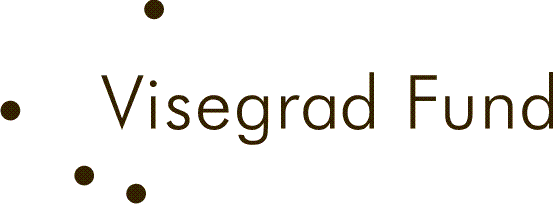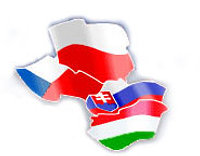Project Publications
| Book 1 | Book 2 | Book 3 | Book 4 | Book 5 | Book 6 | conference articles in journals |
The reserach results have been published as a research monograph and scientific books in 2014 as well as in partner journals:
Wach, K. (2014). Theoretical Framework of the Firm-Level Internationalisation in Business Studies (chapter 1) In: A. Duréndez & K. Wach K. (Eds.), Patterns of Business Internationalisation in Visegrad Countries – In Search for Regional Specifics. Cartagena: Universidad Politécnica de Cartagena (ISBN: 978-84-942562-0-2).
Full text: pdf (free download)
Abstract
Chapter 1 discusses the basics of the firm-level internationalisation process, especially it includes the theoretical foundations for paths, patterns or pathways of internationalisation of businesses.
References
Albaum, G., Strandskov, J., & Duerr, E. (2002).
International Marketing and Export
Management, 2nd ed., Harlow: Addison-Wesley Longman Publishing.
Albaum, G., Strandskov J., Duerr E., & Dowd L.
(1994). International Marketing and Export
Management, 2nd ed., Reading MA: Addison-Wesley.
Anderson, M. (1995). The role of collaborative
integration in industrial
organization:observations from the Canadian aerospace industry. Economic
Geography,
71, pp. 55–78.
Grant, R.M. (2005). Contemporary Strategy Analysis. Chichester: John Wiley and Sons Ltd.
Hashai, N. & Almor, T. (2004). Gradually
Internationalizing ‘Born Global’ Firms: An
Oxymoron?. International Business Review, 13(4), pp. 465–483.
Heenan, D.A. & Permutter, H.V. (1979).
Multinational Organizational Development: A
Social Architectural Approach. Reading, MA: Addison-Wesley.
Hollensen, S. (2007). Global Marketing: A
Decision-Oriented Approach. 4th ed., Harlow:
Pearson Education.
Horská, E., Ubrežiová, I. & Kekäle, T. (2007).
Product adaptation in processes of
internationalization: Case of the Slovak food-processing companies.
Baltic Journal of
Management, 2(3), pp. 319-333.
Horská, E., Mwaura, F.O. & Krasnodębski, A.
(2014). The Role of Cross-Border
Heterogeneity, Location Specificity and Distance Related Variables:
Lessons Learnt
from V4 Marketers in Africa (chapter 10), In: In: Knežević, B. & Wach,
K. (eds),
International Business from the Central European Perspective. Zagreb:
University of
Zagreb.
Jimenéz-Burillo, S. & Jimenéz-Moreno, J.J.
(2013). The Role of the Top Management Team
in the Choice of Entry Modes – Theoretical Perspective. Entrepreneurial
Business and
Economics Review, 1(2), pp. 51-58.
Johanson, J. & Vahlne, J.-E. (1977). The
Internationalization Process of the Firm: A Model
of Knowledge Development and Increasing Foreign Commitments. Journal of
International Business Studies, 8(1), pp. 23–32.
Johanson, J. & Vahlne, J.-E. (2009). The Uppsala
Internationalization Process Model
Revisited: From Liability of Foreignneess to Liability of Outsidership.
Journal of
International Business Studies, 40(9), pp. 1411–1431.
Knight G.A., Madsen, T.K. & Servais P. (2004).
An Inquiry into Born-global Firms in
Europe and the USA. International Marketing Review, 21(6), pp. 645–665.
Kuivalainen, O., Sundqvist, S. & Saarenko, S.
(2012). Internationalization Patterns of Small
and Medium-sized Enterprises. International Marketing Review, 29(5), pp.
448-465.
Lopez, L.E., Kundu, S.K. & Ciravegna, L. (2009).
Born Global or Born Regional? Evidence
from an Exploratory Study in the Costa Rican Software Industry. Journal
of
International Business Studies, 40, pp. 1228–1238.
Mejri, K. & Umemoto, K. (2010). Small- and
Medium-Sized Enterprise Internationalization:
Towards the Knowledge-Based Model. Journal of International
Entrepreneurship, 8(2),
pp. 156–167.
Moen, Ø. (2002). The Born Globals. A New
Generation of Small European Exporters.
International Marketing Review, 9(2), pp. 156–175.
Morrison, J. (2011). The Global Business
Environment: Meeting the Challenges. 3ed ed.,
London: Palgrave Macmillan.
Nowiński, N. & Bakinowska, E. (2012). A Logistic
Model Study of Endogenous and
Exogenous Factors Affecting Polish SMEs’ Internationalization Speed.
Argumenta
Oeconomica, 28, pp. 155-179.
O’Cass, A. & Weerawardena, J. (2008). Examining
the Role of International
Entrepreneurship, Innovation and International Market Performance in SME
Internalisation. European Journal of Marketing, 43(11-12), pp.
1325-1348.
OECD (1997). Globalisation and Small and Medium Enterprises, Volume 1: Synthesis Report. Paris: Organisation for Economic Cooperation and Development.
Ohlin, B. (1967). Interregional and
International Trade. Harvard Economic Studies 39.
Cambridge, MA: Harvard University Press.
Oviatt, B.M. & McDougall, P.P. (1994). Towards a
Theory of International New Ventures.
Journal of International Business Studies, 25(1), pp. 45–64.
Porter, M.E. (1980). Competitive Strategy. Techniques for Analyzing Industries and Competitors. New York, NY: The Free Press.
Porter, M.E. (1985). Competitive Advantage.
Creating and Sustaining Superior Performance/.
New York, NY: The Free Press.
Ricardo, D. (1817). On The Principles of
Political Economy and Taxation. London: John
Murray - Albemarle-Street.
Rundh, B. (2001). International Market
Development: New Patterns in SMEs International
Market Behaviour?, Market Intelligence & Planning, 19(5), pp. 319–329.
Ruzzier, M., Hisrich, R.D. & Antoncic, B.
(2006). SME Internationalization Research: Past,
Present, and Future. Journal of Small Business and Enterprise
Development, 13(4), pp.
476–497.
Smith, A. (1976). An Inquiry into the Nature and
Causes of the Wealth of Nations. London:
W. Strahan and T. Cadell.
Schweizer, R., Vahlne, J.-E. & Johanson, J.
(2010). Internationalization as an Entrepreneurial
Process. Journal of International Entrepreneurship, 8(4), pp. 343–370.
Solberg, C.A. (1997). A Framework for Analysis
Strategy Development in Globalizing
Markets. Journal of International Marketing, 5(1), pp. 9-30.
Stonehouse, G., Hamill, J., Campbell, D. &
Purdie, T. (2004). Global and Transnational
Business: Strategy and Management, 2nd ed., Chichester: John Wiley and
Sons Ltd.
Vahlne, J.-E. & Ivarsson, I. (2014). The
globalization of Swedish MNEs: Empirical evidence
and theoretical explanations. Journal of International Business Studies,
45(3), pp. 227-
247.
Vahlne, J.-E. & Johanson, J. (2012). New
Technology, new environments and new
internationalization process? In: V. Havila, M. Forsgren & H. Håkansson
(eds), Critical
perspectives on internationalisation, London: Pergamon, pp. 209-228.
Vahlne, J.-E. & Johanson, J. (2013). The Uppsala
model on evolution of the multinational
business enterprise: From internationalization to coordination of
networks.
International Marketing Review, 30(3), pp. 189-208.
Vernon, R. (1966). International investment and
international trade in the product cycle.
Quarterly Journal of Economics, 80, pp. 190–207.
Wach, K. (2012a). Europeizacja małych i średnich
przedsiębiorstw: rozwój przez
umiędzynarodowienie. Warszawa: PWN.
Wach, K. (2012b). Wybrane modele
internacjonalizacji przedsiębiorstw bazujące na wiedzy,
In: S. Wydymus, M. Maciejewski (eds), Innowacyjność i wiedza we
współczesnym handlu
międzynarodowym. Kraków: Fundacja UEK, pp. 254-64.
Wach, K. (2014a). Europeanisation of Firms as
Their International Growth within the
European Union: The Empirical Investigation into the
Internationalisation Level
among Polish Firms (chapter 1), In: Knežević, B. & Wach, K. (eds),
International
Business from the Central European Perspective. Zagreb: University of
Zagreb.
Wach, K. (2014b). Internationalisation and
Globalisation as the Wider Context of
Europeanisation from the Macro- and Microeconomic Perspective. Horyzonty
Polityki,
5(10), pp. 11-30.
Wach, K. (2014c). The Theoretical Modelling of
the Firm-Level International
Competitiveness in Business Studies (chapter 5), In: D. Kiendl-Wendner &
K. Wach
(eds), International Competitiveness in Visegrad Countries: Macro and
Micro Perspectives.
Graz: Fachhochschule Joanneum.
Wach, K. (2014d). Familiness and Born Globals:
Rapid Internationalisation among Polish
Family Firms. Journal of Intercultural Management, 2 (3-4).
Wach, K. (2014e). The Role of Knowledge in the
Internationalisation Process: An Empirical
Investigation among Polish Businesses (chapter 7) In: D. Kiendl-Wendner
& K. Wach
(eds), International Competitiveness in Visegrad Countries: Macro and
Micro Perspectives.
Graz: Fachhochschule Joanneum.
Wach, K. & Wehrmann, C. (2014). Entrepreneurship
in International Business:
International Entrepreneurship as the Intersection of Two Fields:, In:
A.S. Gubik &
K. Wach (eds), International Entrepreneurship
and Corporate Growth in Visegrad
Countries. Miskolc: University of Miskolc Press.
Wach, K. & Wojciechowski, L. (2014). The Size
and the Strategic International Orientation:
The Use of EPRG Model among Polish Family and Non-Family Firms.
Przedsiębiorczość i Zarządzanie, XV(7[1]), pp. 143-156.
Whitelock, J. (2002). Theories of
Internationalization and Their Impact on Market Entry.
International Marketing Review, 19(4).
Wind, Y., Douglas, S.P. & Perlmutter, H.V.
(1973). Guidelines for Developing International
Marketing Strategies. Journal of Marketing, 37(2).
Welch, L.S. & Luostarinen, R. (1988).
Internationalization: Evolution of a Concept. Journal
of General Management, 14(2), pp. 34-55.
Zahra, S.A., & George, G. (2002). International
Entrepreneurship: the Current Status of the
Field and Future Research Agenda, In: M.A. Hitt, R.D. Ireland, S.M.
Camp,
D.L. Sexton (eds), Strategic Entrepreneurship: Creating a New Mindset,
London –
Oxford: Blackwell Publishers.
Czech Republic
Hungary
Poland
Slovakia

Contact:
Dr hab. Krzysztof Wach
Cracow University of Economics
wachk@uek.krakow.pl
www.wach.uek.krakow.pl

